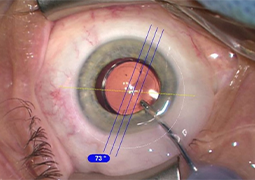Purpose: To evaluate the clinical outcomes following the implantation of a new toric intraocular lens (TIOL) with extended depth of focus (EDOF) Bi-Flex ELON Toric POB-MA 877PETY (Elon®, Medicontur Medical Engineering Ltd., Zsámbék, Hungary), including analysis of lens rotational stability and assessment of patient satisfaction.
Material and methods: In a retrospective, monocentric clinical study, 29 eyes of 18 patients (11 men and 7 women) with presbyopia, cataracts, and corneal astigmatism were evaluated. These patients underwent uncomplicated cataract surgery with Bi-Flex ELON Toric TIOL implantation. Postoperative assessments included measurements of monocular uncorrected and corrected distance visual acuity (UDVA, CDVA) and near visual acuity (UNVA, CNVA), rotational stability of the TIOL, and subjective evaluation of visual quality using a questionnaire. Follow-up examinations were conducted 6 months postoperatively (ranging from 3 to 9 months).
Results: The mean postoperative monocular UDVA improved from 0.4 ±0.2 to 0.90 ±0.1 (p < 0.0001). Average CDVA was 1.0 ±0.2. All patients achieved monocular UDVA ≥ 0.6 and CDVA ≥ 0.8. The average postoperative monocular UNVA was at Jaeger chart level 4, and CNVA reached Jaeger level 1 in all patients. The mean residual astigmatic refraction was -0.6 ±0.4 Dcyl (p = 0.0003), and the mean absolute rotational deviation was 1.9 ±2.65°. Patient satisfaction was assessed on a scale of 1 to 5, with an average score of 1.4. Targeted questioning revealed that halo-type dysphotopsia was reported in 52 % of eyes, glare-type in 17%, and no dysphotopsia in 31%.
Conclusion: Implantation of a Bi-Flex ELON Toric TIOL for correcting astigmatism and presbyopia significantly improved both distance and near visual acuity. The rotational stability of the lens was high, and the majority of patients achieved independence from wearing spectacles.

